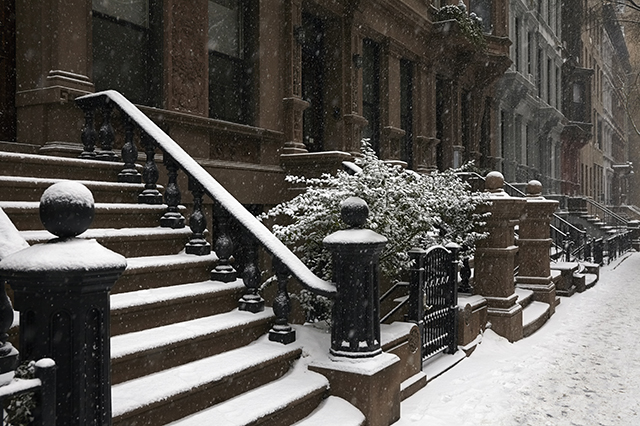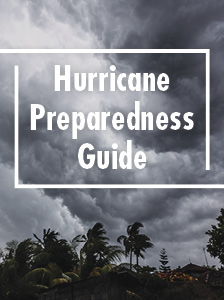Winter storms caused nearly $6 billion in insured losses in 2022, according to the Insurance Information Institute. Wind and hail consistently lead homeowners claims, followed by water damage and freezing.
Make sure you’re ready for winter insurance risks and the challenges cold weather may bring your way.
Top Winter Insurance Claims
- Ice dams. When cold weather persists, ice dams can form on the edge of your roof, blocking melting snow from falling away and refreezing as temperatures drop. This cycle of melting and refreezing can cause ice to form under shingles and could eventually lead to leaks and water damage inside your home.
- Roof and siding damage. Heavy snowfall, sleet, hail and perilous winds can make winter weather unpredictable. Because roofing and siding bear the brunt of this impact, they comprise a significant portion of homeowner losses over the winter months.
- Losses from falling tress and limbs. This is one of the most common claims AAA Insurance sees. While structural damages to your home or car caused by falling trees and limbs from heavy snow and wind are obvious losses, power loss could also be an issue. To possibly get reimbursed for the cost of lost groceries due to a power outage, check with your insurance agent to see if food spoilage coverage is on your policy.
- Frozen pipes. The most common winter insurance claims stem from how the elements affect your home’s exterior, but don’t forget about your plumbing. When pipes freeze, they can burst and cause substantial water damage. The most severe instances happen when homes experience a power outage, resulting in a loss of heat over a significant period of time. So, if you plan on being away from home for an extended period of time, it’s a good idea to shut off the water to your home and drain your pipes.
- House Fire. This kind of property damage is typically traced back to a secondary heating source. “Although many homeowners think of themselves as being responsible with this, individuals that live in multi-family homes, apartments or condos need to also consider if they’re adequately covered if they suffered a loss due to a neighbor’s negligence,” said Ray Eng, vice president of insurance sales for AAA Northeast.
What You Can Do to Prepare for Winter
- Fight back against ice damming. Add extra insulation to your roof to let the indoor heat melt the snow and ice slowly from the inside out. If your roof is prone to ice damming, use a roof rake shortly after a storm to clear as much snow off as you can, even if it’s just around the gutter line. Do not climb onto the roof; if you need a more thorough cleaning, hire a contractor.
- Insulate your pipes, doors and windows. By adding insulation to your hot water pipes, you can minimize the chances those pipes will freeze over and blow. Air leaks near doors or windows should also be eliminated with weather stripping or other door draft stoppers.
- Keep an eye on your trees. Fallen tree branches are one of the most likely – and most damaging – forms of debris you’ll face during cold weather. To prevent damage, trim back any trees that are too close to your home or driveway.
- Inspect your ducts and plumbing. Your furnace and heating ducts need to be in working order to prevent or minimize winter damage. Reach out to a professional if needed for a thorough inspection.

Review Your Insurance Policy
Try to make a habit of reviewing your insurance policy and updating your documentation, including photos, to reflect your home’s condition before the winter. This gives you an opportunity to refresh your understanding of what is included and, accordingly, what actions you might need to take to protect your home.
Most home insurance policies will provide coverage for wind or falling debris that may cause damage to your home.
Damage caused by flooding – which can occur in the winter if the temperature spikes – is not within the scope of a standard policy. Flood insurance must be purchased separately. In insurance terms, a “flood” has a very specific definition and is excluded from a homeowner policy; however, water from a leaking pipe, for example, is typically protected if purchased as part of a policyholder’s coverage.
Speak to a AAA insurance agent about flood insurance.
Liability coverage should cover you in case someone slips and falls on your property.
Check these tips to make sure your home insurance is winter-ready.
AAA provides homeowners insurance and much more. Talk to a AAA Insurance agent today.
3 Thoughts on “The Most Common Winter Insurance Claims”
Leave A Comment
Comments are subject to moderation and may or may not be published at the editor’s discretion. Only comments that are relevant to the article and add value to the Your AAA community will be considered. Comments may be edited for clarity and length.


















The solution to “ice dams” is not going to accomplish that much. If one has reasonably occurring ice dams one needs a professionally installed roof valley heating system. Works fabulous. Not talking about the thin wire stuff from Home Depot. Very few systems around and hard to find a system and installer. This one has a sensor to turn on automatically, etc. Only approach that is foolproof for ice dam prevention. Mine does a fabulous job. Without it – in a defrost/re-freeze weather situation one can end up with ruined walls.
I am insured through AAA. If we go away for the winter and shut off our water drain our pipes,what effect will it have on my boiler that supplies heat to the house? It is natural gas/tankless we would be gone for approx.7/8 months. We live in Rhode Island.
Hi Wright – for the best advice on this, we recommend reaching out to your furnace company. Thank you for reading! -MP